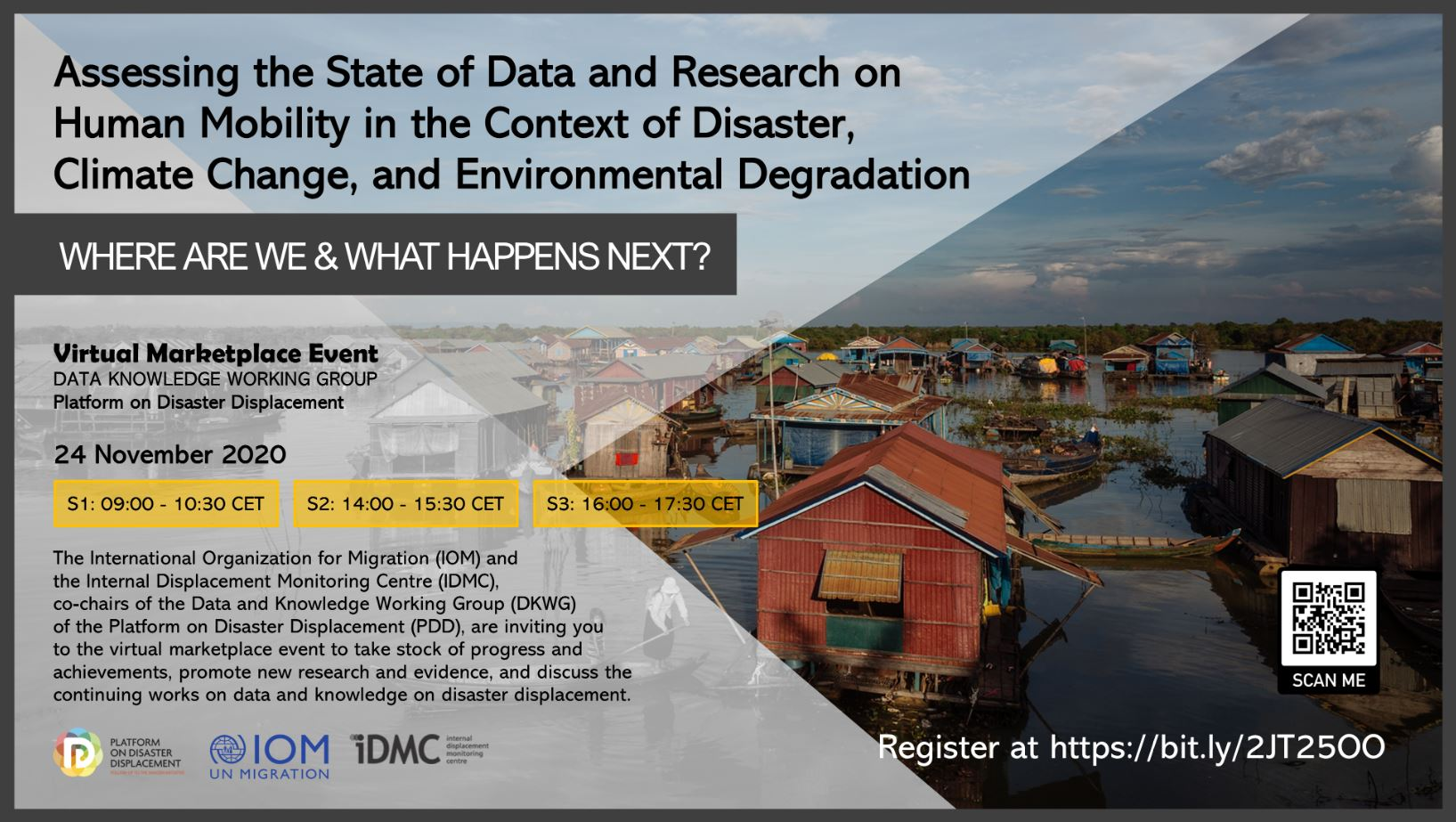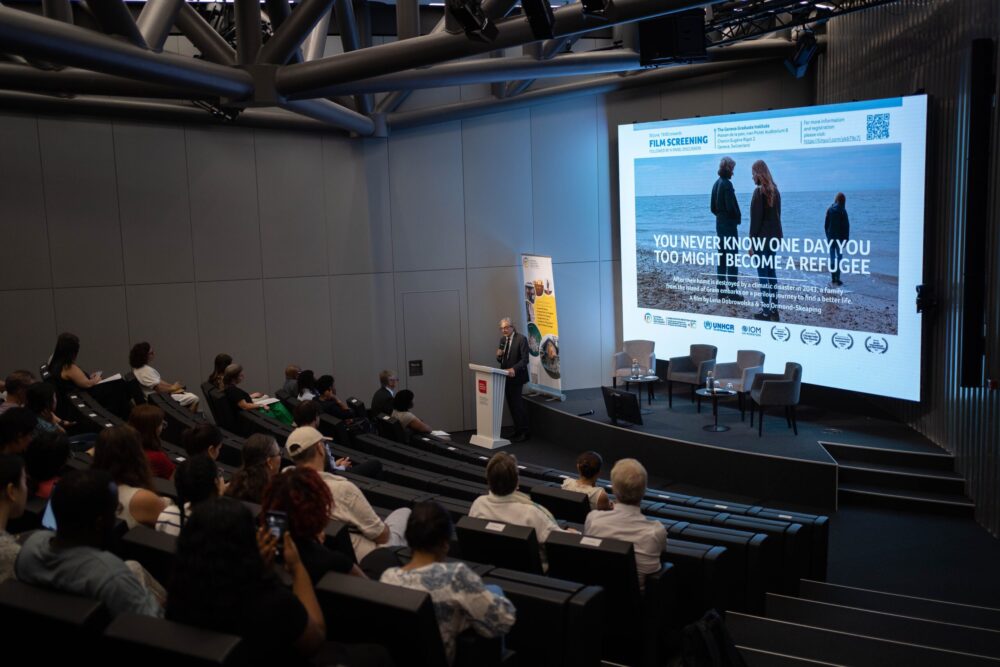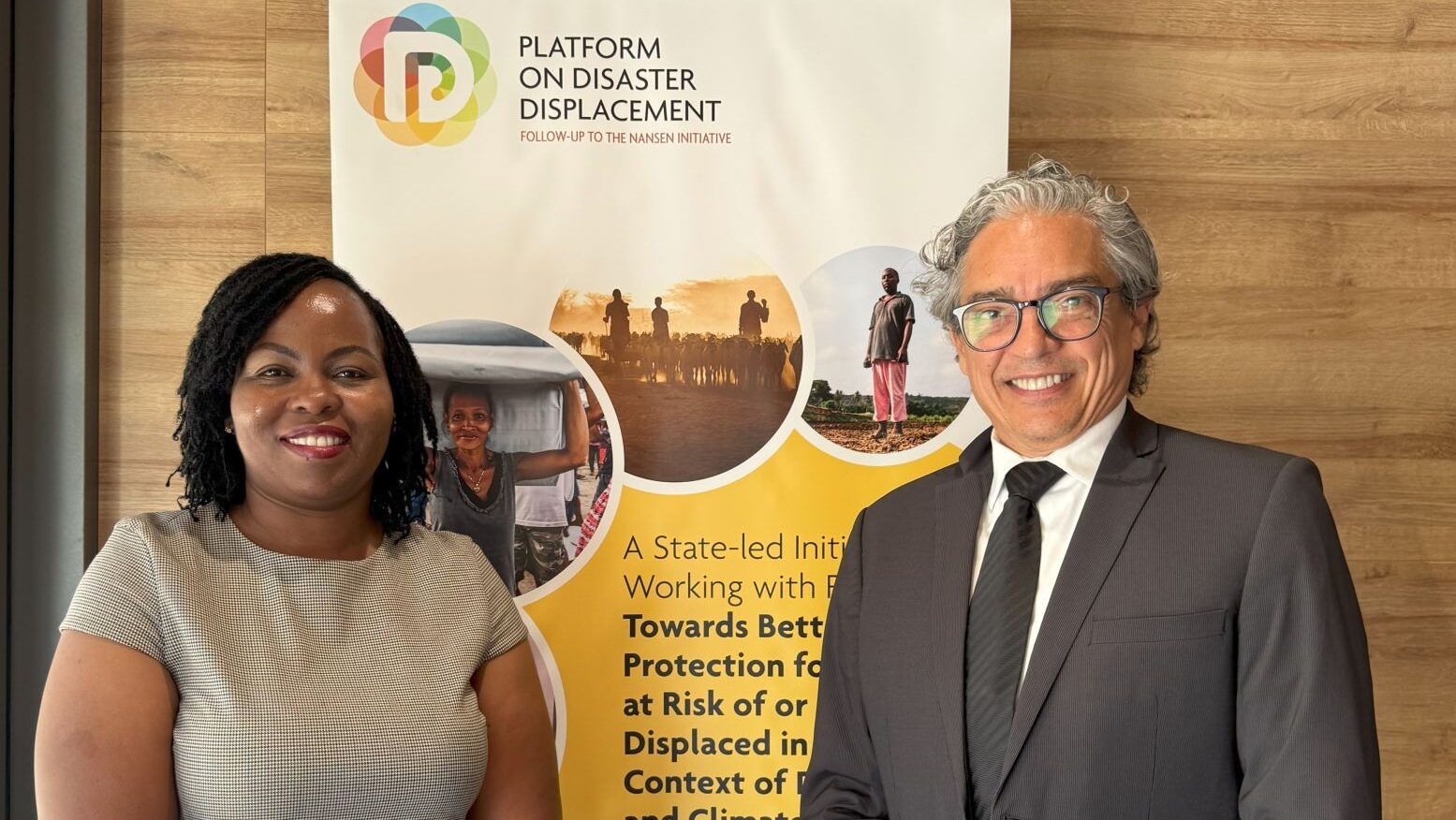Virtual Event | Data on Human Mobility in Disaster Contexts: Where Are We and What Comes Next?

Data and Knowledge Working Group (DKWG), Platform on Disaster Displacement
Assessing the state of data and research on human mobility in the context of disasters, climate change and environmental degradation: Where are we and what comes next?
Virtual marketplace event on 24 November 2020
Register here: https://bit.ly/2JT25OO
(please note that the same link will be used to attend all sessions)
1. Background
Data collection on human mobility (Displacement, migration, planned relocation) in the context of disasters, climate change and environmental degradation remains a priority for the international community as the scale of disaster displacement continues to increase. For example, the Internal Displacement Monitoring Centre’s (IDMC) 2020 Global Report on Internal Displacement (GRID) found that new displacements as a result of disasters in 2019 were three times the number of new displacements caused by conflict. With nearly 1,900 disasters that triggered 24.9 million new displacements across 140 countries and territories in 2019; these are the highest figures that have been recorded since 2012[1]. The current global pandemic has even further complicated the mobility landscape in ways which have the potential to exacerbate the challenges already faced by populations impacted by disasters, climate change and environmental degradation.
While academia, governments and international organizations continue to make positive strides towards improving data on disaster displacement, data and knowledge gaps persist. The IDMC’s 2019 GRID report identified those gaps, including inconsistent methodologies or lack of disaggregated data, and ways to overcome them[2]. The importance of data for well-informed policies to address human mobility in the context of disasters and climate change is reiterated throughout different global processes, such as the Global Compact for Migration (GCM), the Task Force on Displacement (TFD) under the United Nations Framework Convention on Climate Change (UNFCCC), the Sendai Framework for Disaster Risk Reduction (SFDRR) and the 2030 Agenda for Sustainable Development (SDGs). The High-Level Panel on Internal Displacement (HLP), established by the UN Secretary-General, also highlights the importance of improvement to the collection, analysis and use of quality data relevant to internal displacement as one of its focus areas. The Nansen Initiative Protection Agenda (NIPA) has identified in its priority areas for future action to promote and facilitate the collection of data and enhanced knowledge, in order to address gaps and challenges regarding disaster displacement, migration and planned relocation.
In light of this, the Platform on Disaster Displacement (PDD), the International Organization for Migration (IOM) and the Internal Displacement Monitoring Centre (IDMC) continue to prioritise addressing these gaps and challenges. This long-standing commitment is embodied in the Data and Knowledge Working Group (DKWG), established in 2017 within the Advisory Committee of the Platform on Disaster Displacement (PDD) and co-chaired by IOM and IDMC. To date, the working group has hosted an expert meeting and met three times with the aim to strengthen coordination and the capacity of data collection and information systems at the global, regional and national levels to collect, monitor and analyse data on disaster displacement and other types of human mobility in such contexts.
Following the success of the last expert meeting of the DKWG held on 25-26 April 2018 and of the Advisory Committee’s workshop on 4-5 February 2019, the DKWG will host a virtual marketplace event on 24 November 2020 to take stock of progress and achievements, facilitate knowledge exchange, and continue promoting the work around data and knowledge on disaster displacement, to discuss continuing gaps and challenges.
2. Objective
DKWG members and other partners will be invited to present their data and knowledge related work in a virtual marketplace forum that will allow participants to exchange on methodologies, new evidence from recent researches, remaining gaps and challenges related to data collection and analysis, and how those data can better support policy action related to human mobility in the context of disasters, climate change and environmental degradation.
This event is in line with the PDD Strategic Framework and Workplan 2019-2022, the IOM’s vision and work on Migration, Environment and Climate Change, the IDMC’s global monitoring of disaster displacement and the commitment of both IOM and IDMC to support PDD in the implementation of the recommendations of the Nansen Initiative Protection Agenda. It will thus contribute to support the objectives of the PDD, by identifying opportunities to create synergies, combine efforts and build further interoperability between different initiatives implemented by the members of the Advisory Committee and other relevant partners. Contributions to the marketplace will further inform the development of the 2021 Global Report on Internal Displacement, focusing on climate change and internal displacement, through the IDMC expert forums on data and risk assessment.[3]
3. Methodology and Expected Results
Methodology
• A stocktaking exercise has been conducted ahead of the event to collect information on recent progress related to data and knowledge on human mobility in the context of disasters, climate change and environmental degradation.
• Based on the results of the stocktaking exercise, three sessions will be organized during this marketplace to accommodate all presentations. It has been decided not to organize these sessions per thematic focus, but to put together speakers from similar time zones, to maximize participation.
• Each speaker is asked to focus their presentation on how their work contributes to reduce the gaps on data and knowledge related to disaster displacement, and will have a maximum of 10 minutes to present to allow time for a moderated questions and discussion session.
Expected Results
• The marketplace will enhance data, knowledge and practice sharing among the members of the PDD Advisory Committee.
• Outcomes will contribute to the revision of the action plan of the DKWG.
• Outcomes of the marketplace will inform the development of the 2021 Global Report on Internal Displacement.
4. Practical and Organisational Information
Participation is open beyond PDD Advisory Committee Members to all interested actors but registration in advance is required. The meeting will take place in a virtual environment and access instructions will be provided to participants along with their registration. The timing of the three sessions has been devised to permit colleagues from a range of regions and time zones to participate and present. A virtual opening plenary will be recorded and made available for all participants to watch in their own time before the marketplace sessions.
The marketplace sessions will be recorded and made available publicly via the co-organizers’ websites (PDD YouTube Channel, IOM’s Environmental Portal, IDMC etc.). There will be no written report on the three sessions but the co-chairs and the PDD Secretariat will bring the outcomes from the marketplace back to the PDD Steering Group, into a DKWG Action Plan and onward to the 2021 GRID.
For those interested in joining the PDD’s Advisory Committee, please contact the PDD Secretariat at info@disasterdisplacement.org
[1] IDMC, 2020 https://www.internal-displacement.org/global-report/grid2020/
[2] IDMC, 2019 https://www.internal-displacement.org/sites/default/files/publications/documents/2019-IDMC-GRID.pdf
[3] For more information on the IDMC expert forums and the 2021 Global Report on Internal Displacement, please contact sylvain.ponserre@idmc.ch
Useful tools
Learn more about the co-chairs of the DKWG the Internal Displacement Monitoring Centre (IDMC) and the International Organization for Migration (IOM)
Download the Concept Note for the event
 Loading...
Loading...
Download the Programme for the event
 Loading...
Loading...
Download the Event Flyer
 Loading...
Loading...
Read about the last DKWG meeting in the 2019 Advisory Committee Workshop Report
 Loading...
Loading...
Learn more about PDD’s work on data and knowledge in our Workplan 2019-2022
